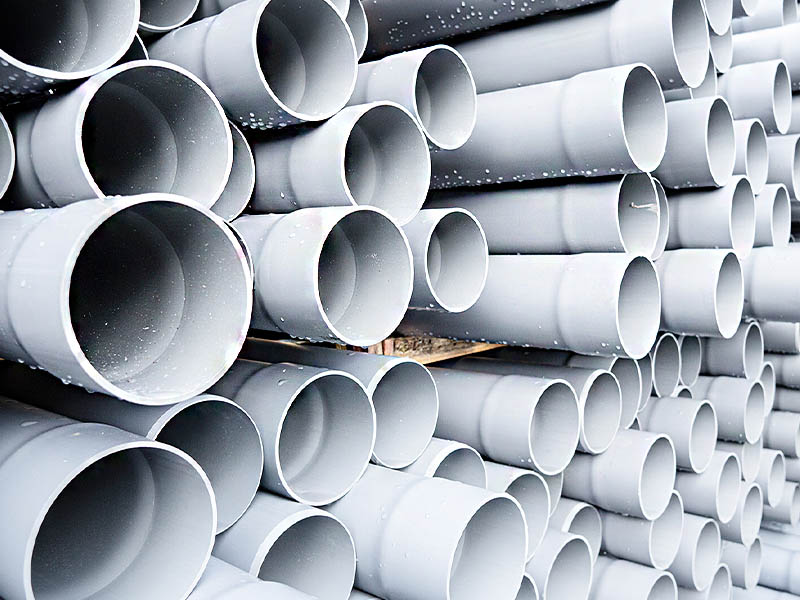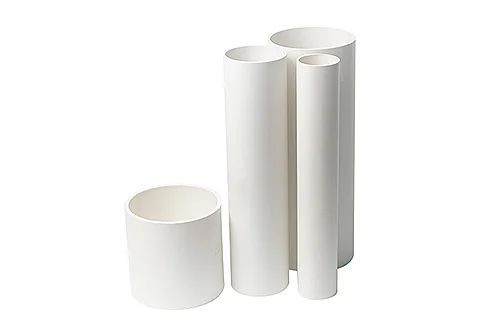In modern construction and infrastructure construction, PVC (polyvinyl chloride) pipes are widely used in a variety of scenarios due to their excellent physical properties, chemical stability and affordability. Însă, even PVC pipes of the same material are divided into two categories, PVC drainage pipes and water supply pipes, according to their specific uses, each with distinct application characteristics. This article will deeply analyze the difference in the use of the two to help you make a more accurate choice in actual operation.
1. PVC Drainage Pipes: Specializing in Sewage and Wastewater Excretion

PVC-U Drainage Pipe
1. Main Function Positioning
PVC drainage pipes are mainly used in sewage, rainwater and other wastewater discharge systems inside and outside buildings. It has excellent corrosion resistance, can effectively resist the erosion of acidic and alkaline liquids encountered in daily life, and ensure the smooth flow of pipes under long-term use.
2. Features Overview
– Strong impact resistance: It can maintain good toughness even in low temperature environments and is not easy to rupture due to external pressure.
– Easy installation: It adopts adhesive or rubber ring socket connection, which can be quickly installed without complex tools.
– Good sound insulation effect: Compared with metal pipes, PVC material can better absorb water flow sound and reduce noise pollution.
– Cost-effectiveness: Compared with other materials, PVC pipes have lower costs, less maintenance costs and longer service life.
Typical application scenarios
– Drainage systems for indoor toilets and kitchens in buildings;
– Flood control drainage in basements and garages;
– Wastewater discharge lines in industrial plants;
– Parts of urban rainwater and sewage separation pipe networks.
2. PVC water supply pipes: ensuring the delivery of clean water sources

1. Main functional positioning
Compared with drainage pipes, PVC water supply pipes are mainly responsible for delivering drinking water, fire water and other fluid media that need to ensure clean water quality. Therefore, it has higher requirements in hygiene standards and pressure resistance.
2. Overview of features
– Sanitary and safety: It meets national drinking water hygiene standards, does not contain harmful substances such as heavy metals, and will not cause secondary pollution to water quality.
– Pressure bearing capacity: It has good compressive strength and can keep the pipeline intact even under high pressure conditions, which is suitable for long-distance water supply lines.
– Good temperature resistance: It can maintain a stable state within a certain temperature range and is suitable for short-term use in hot water systems.
– Prevent leakage: Use special connection accessories, combined with hot melt welding or threaded connection, to ensure that the pipe connections are tight and leak-free.
Typical application scenarios
– Tap water supply in residential areas;
– Direct drinking water systems in commercial buildings, Spitale, and schools;
– Farmland irrigation, garden sprinkler systems;
– Fire water source pipelines.
Summary: Selection points
Correctly distinguishing the uses of PVC drainage pipes and water supply pipes is the basis for ensuring the safe and efficient operation of the entire pipeline system. When facing specific engineering projects, it is necessary to make reasonable selections based on factors such as fluid properties, working conditions, and expected life:
– For occasions involving sewage and wastewater treatment, PVC drainage pipes are preferred to cope with the challenges brought by corrosive media and large amounts of suspended solids.
– When it comes to drinking water or application scenarios where water quality needs to be maintained clean, PVC water supply pipes that meet hygiene standards must be used to ensure that human health is not affected.
In summary, an in-depth understanding of the basic properties and applicable scope of the two PVC pipes will help us make more scientific and reasonable decisions in actual work, thereby improving the overall project quality and user satisfaction.
 Zhongtong HDPE PIPE System Furnizor profesional
Zhongtong HDPE PIPE System Furnizor profesional